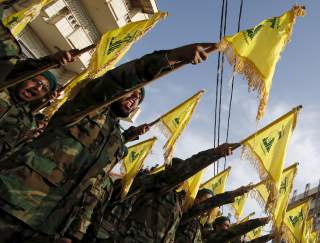Will Israel Go to War Over Hezbollah's Precision-Guided Missiles?
Israel’s Syria campaign has demonstrated that, despite their best efforts, Iran and its proxies “have no deterrence whatsoever” against Israel. But this may not last.
TEL AVIV—In early September, Israel’s military shelled a series of Hezbollah factories and installations in Lebanon’s Bekaa Valley. The strikes represented the most significant Israeli operation against the terrorist group since the 2006 Lebanon War. It also marked the start of what could well become another military conflict between Israel and the Lebanese Shia militia.
That potential clash is an outgrowth of Israel’s efforts to eliminate Iran’s strategic footprint in the Levant, which has grown exponentially over the past half-decade as a result of the Islamic Republic’s campaign in support of the Syrian regime. The effort has allowed Iran to establish an expeditionary presence along Israel’s northern border—one that, over the past few years, has prompted a significant Israeli military response.
For now, Israeli officials seem generally satisfied with the results. According to defense experts here, the Israeli operations have succeeded in establishing at least a minimum level of deterrence against Iran in Israel’s north—and in demonstrating that Qassem Soleimani, the feared Iranian general who has been identified as the architect of Tehran’s Syria campaign, is not, in fact, “ten feet tall.” Other observers put the matter even more starkly: Israel’s Syria campaign has demonstrated that, despite their best efforts, Iran and its proxies “have no deterrence whatsoever” against Israel.
Yet, in recent weeks, the Israeli-Iranian front has shifted further west to Lebanon. There, Israeli experts say, Iran is assisting Hezbollah with what amounts to a major industrial project designed to improve the accuracy and precision of its extensive arsenal of short-range missiles and rockets. In turn, this “precision project” represents a grave threat to Israeli security, because it has the potential to qualitatively alter the missile threat facing the Jewish state.
Almost as soon as the 2006 war was over, Hezbollah began reconstituting its strategic arsenal. To do so, it turned to its main patron, Iran, for assistance, and in response received massive shipments of munitions from Tehran. Already half-a-decade ago, the terror group was known to have amassed some 100,000 munitions with which it could menace Israeli territory. (Today, that figure is believed to be closer to 150,000). Yet, these missiles and rockets were uniformly “dumb”: simple in design, of limited accuracy, and well within the capabilities of Israeli defenses to defeat.
Of late, however, that state of affairs has increasingly been called into question, thanks to Iran’s concerted efforts to expand the lethality of its most virulent proxy’s missile capabilities—and in the process, fundamentally alter the strategic equation facing decisionmakers in Jerusalem. “In the past, we could ignore some percentage of the missiles fired by Hezbollah, because we knew they would be inaccurate and wouldn’t hit their intended targets,” one Israeli expert told me. “Now, we don’t have that guarantee.”
This, in turn, threatens to lock Israel into an economic “war of attrition” in which the Jewish state is forced to expend disproportionate resources to intercept comparatively cheap Hezbollah missiles. Given the size of the group’s current arsenal, the prospects of doing so are potentially economically ruinous.
In response, Israel’s options are essentially threefold. The country could adopt a wholly defensive posture, relying on existing anti-missile systems and new technologies now in development to deal with the incipient precision missile threat. Such a strategy may indeed suffice, but Israeli defense research—much of which is conducted in collaboration with the United States—is currently limited by an Obama-era Memorandum of Understanding that makes it difficult for America to surge funds to Israel and spur faster technological development as needs dictate.
Alternatively, Israel could embrace deterrence, seeking to shape Hezbollah behavior through offensive action. This, effectively, is the strategy that the Israeli military is currently pursuing via airstrikes and bombings that raise the costs to Hezbollah and Iran of continuing work on sophisticated missiles. But there is no guarantee that such an approach will prompt the necessary restraint on the part of Hezbollah. According to the Israeli Defence Forces, the terror group is actively preparing for a major offensive, one whose “main effort” will entail the “firing hundreds of rockets and missiles at Israel per day.”
In the face of such a plan, the most realistic option may well be a resumption of full-scale hostilities between Israel and Hezbollah. In any such conflict, Israel will seek to bring overwhelming force to bear against the group and decisively dismantle its strategic arsenal and operational capabilities.
That possibility is certainly a worrying one for a weary Israeli public, which is loathe to embark upon yet another regional conflict. Yet, more and more, officials in Jerusalem appear convinced that the current period of relative calm—what Israelis have taken to calling the “campaign between the wars”—has run its course, and that decisive action will be unavoidable to truly reduce the latest iteration of the Iranian threat.
Ilan Berman is senior vice president of the American Foreign Policy Council in Washington, DC.
Image: Reuters

